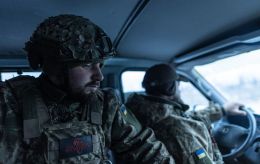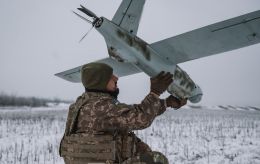'War is a good teacher. If you want to live, learn.' Story of medics in Avdiivka
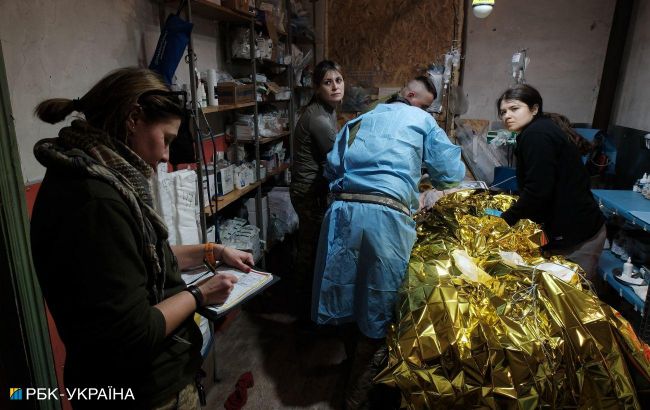 Medics at the stabilization point (photo: Vitalii Nosach / RBC-Ukraine)
Medics at the stabilization point (photo: Vitalii Nosach / RBC-Ukraine)
Combat medics on the front lines save lives under conditions that no medical university will ever teach. Most of them don't even have medical education. However, it doesn't stop them from evacuating and stabilizing Ukrainian soldiers daily, under fire with weapons in hand. Here is the report by RBC-Ukraine from the Avdiivka front.
Every day, combat medics evacuate dozens of injured soldiers from the front lines. They provide immediate assistance right there, without wasting precious minutes. Medics try to reach the most dangerous zones to avoid forcing the wounded soldier to walk kilometers.
Medics perform their work quickly and calmly - in the conditions they are in, it looks at least surreal. The soldiers are brought to points where they are being treated in various conditions. Some scream in pain, while others almost lose consciousness. Medics meet each soldier with a still face, determine the condition within a few seconds, and start their work.
Tea ceremony near Avdiivka
We arrive at the positions of the combat medics, who are enjoying moments of calm amid chaos. From a tightly tied bag, the combat medic with a call sign Kylym ("Carpet") takes out Chinese tea ceremony utensils - a ceramic teapot and four cups. The medic admits that it is the first opportunity they've had to use this set, as they don't have guests in their temporary home very often. He pours green tea leaves, which quickly color the water. Kylym says that such pleasant moments help to keep spirits up at the front line. While waiting for the tea, we're listening to a story about how the guys celebrated New Year at the Avdiivka Coke and Chemical Plant.
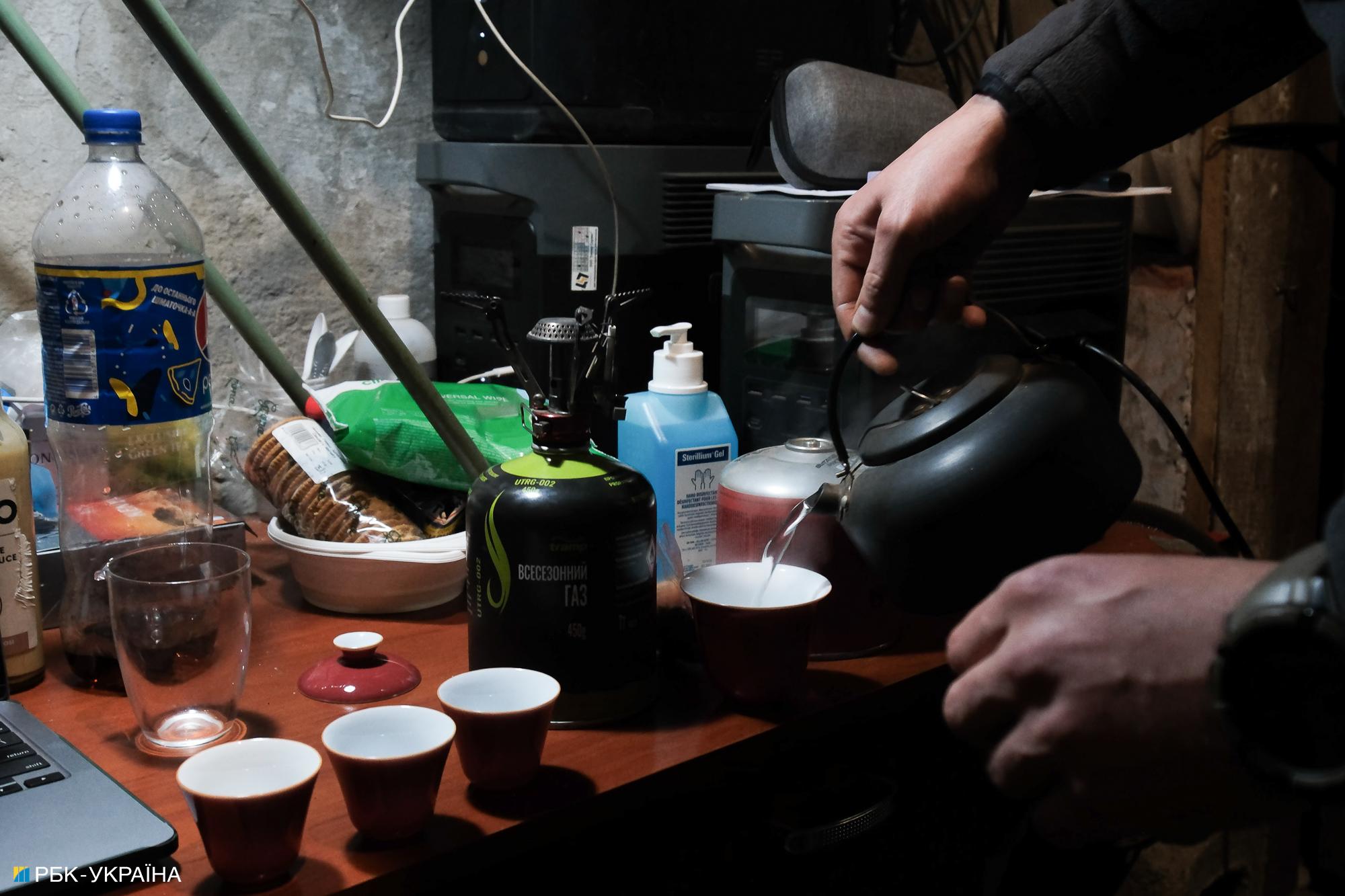
"Right at the Coke and Chemical Plant, in a bunker. We made some Olivier salad, cut some sandwiches, and had such a nice table. Someone even had some Brie cheese sent by relatives. And as soon as we sat down to the table at 11 p.m., the Russians had already celebrated the holiday and started greeting us with phosphorus bombs and an 82-mm mortar."
The guys recall that the sky was covered with flashes, like fireworks that could cost you your life to watch. However, later Ukrainian artillerymen also greeted the Russians with several salvos, so no one shot anymore until the morning.
"Total Rock and Roll"
As we move further towards the positions of the medics, we are told about the evacuation process. The first stage is the casevac. Usually, medics patrol positions nearby until the radio of one of the soldiers starts crackling and shouting: "Wounded!" A group of medics quickly gets into the Bradley and drives to the position. While the armored ambulance is on the way, the commander transmits information about the wounded soldier's condition via radio so that everything necessary can be prepared in advance and a rescue plan can be drawn up. They already know where the wounded man is, so they quickly find him, load him into the Bradley, and on the way back they immediately begin to provide first aid.
We are shown a video of one of the evacuations, filmed on body cameras. The soldiers are walking along a fence that is covered with small and large holes. A soldier is lying in a small niche under the fence. He sees the medics and starts moaning weakly. Next to him, his comrade-in-arms lies dead. "Stay calm, don't panic now, stay calm," say the soldiers, and gently pull the man out of the pit. He is almost exhausted, so his moaning is very weak. As soon as they put the soldier on a stretcher, a warning about shelling is given over the radio, and everyone quickly lies down on the ground. When the Russians stop shooting, the medics immediately take the stretcher and carry the soldier to the ambulance. There they cut the tight fabric of his uniform and tamponade his wounds.
On the positions, you need to move very quickly because the medics themselves become targets for the enemy. But there is no other way - the soldiers await urgent assistance at the forefront, so every minute counts. Combat medic with a call sign Apelsyn ("Orange") tells about one of the most dangerous evacuations.
"There was direct shelling already. We were on our way to pick up a wounded soldier. Just before the air, we hear that the 120-mm mortar is working on them. But we were going anyway. We knew our guys were there."
Then the driver saved the entire crew almost instinctively. Assessing the situation, he decided to cover the side of the armored vehicle while loading the wounded. It played a crucial role because it later became known that within seconds, the 110-mm mortar landed in the same spot.
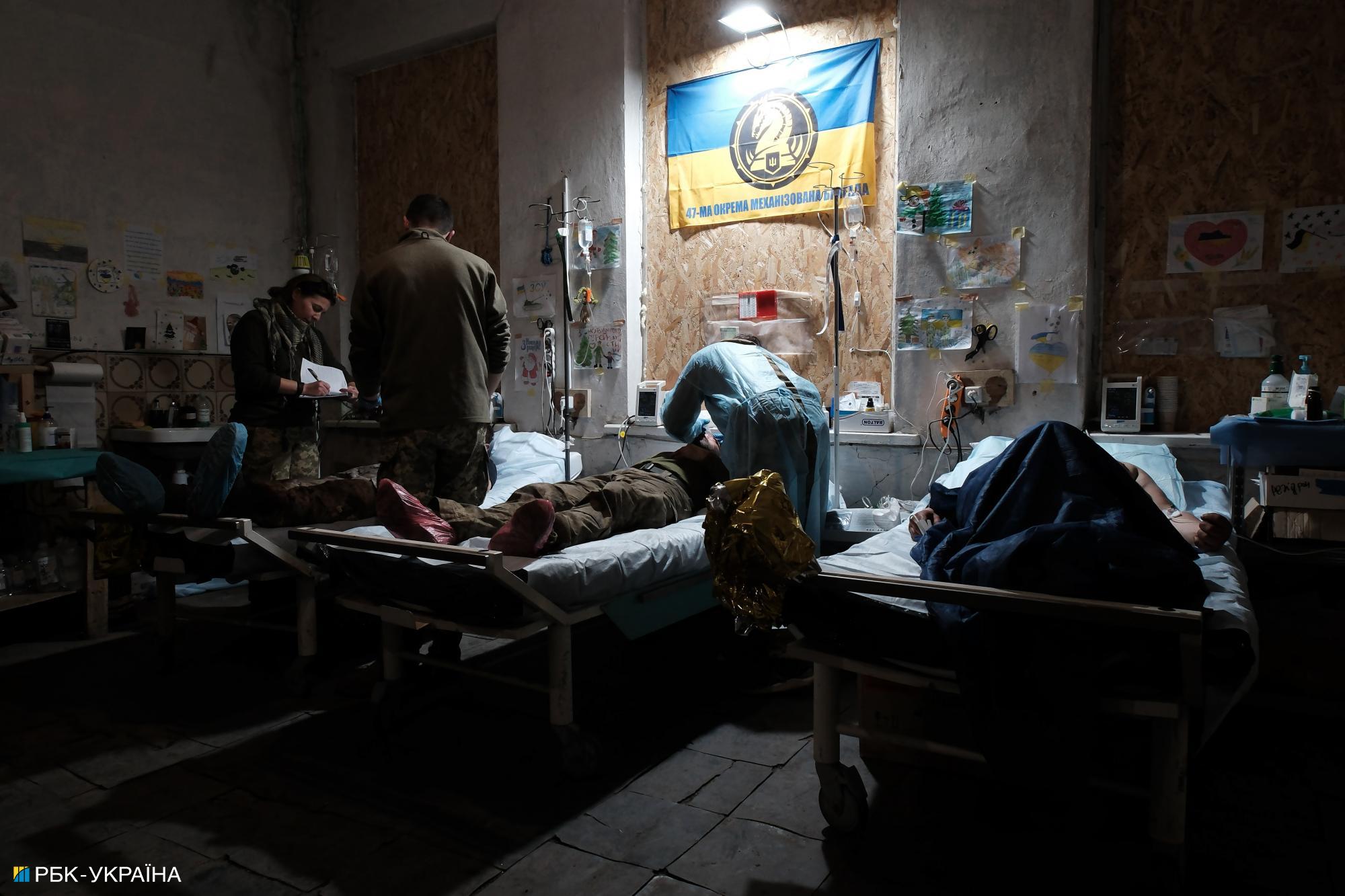 "If it weren't for him, we might not even be sitting here," adds Apelsyn.
"If it weren't for him, we might not even be sitting here," adds Apelsyn.
The soldier confesses that there were indeed many situations where danger was sensed instinctively. War sharpens and exposes senses - sight becomes clearer, hearing sharper. Hence, experienced fighters can leap into a trench seconds before an unexpected shelling begins or close the hatch of an armored vehicle on the move.
Evacuation means speed. Precise implementation of protocols and, as one of the medics said, "the head thinks, the hands act." In conditions where soldiers everywhere scream in blood-soaked uniforms, medics become machines - devoid of emotions and feelings, with swift, perfected movements. Only afterward, after their shift, do they allow themselves to feel the losses or the lives saved. They admit that there were moments when soldiers died right in their arms. Yet, they had to keep working because many others awaited their rescue.
Kylym confesses with a smile that humor helps greatly in such moments, especially the dark one. They joke with each other, with journalists who come to their positions. They joke about the wounded - because distraction from pain is necessary.
"Sometimes we say, 'We'll get you now, and you'll have drugs, girls, and total rock and roll."
Medevac and stabilization
The armored vehicles speed away from the front line. The main mission is accomplished - fighters are alive. A few kilometers away at the designated point, another group awaits on standby. The wounded are carefully transferred into the vehicles. Here, away from ground zero, there's a chance to slow down a bit and thoroughly examine the guys to understand the full picture. The next point is the stabilization point.
"We have work to do!" shouts the chief medic. The calm rhythm immediately shifts to a coordinated and rapid execution of the rescue and examination algorithm. Each medic knows what to do. Stretchers with heavily wounded soldiers who came under fire are carried in. They have gunshot, shrapnel, blunt, penetrating chest injuries, and spinal damage.
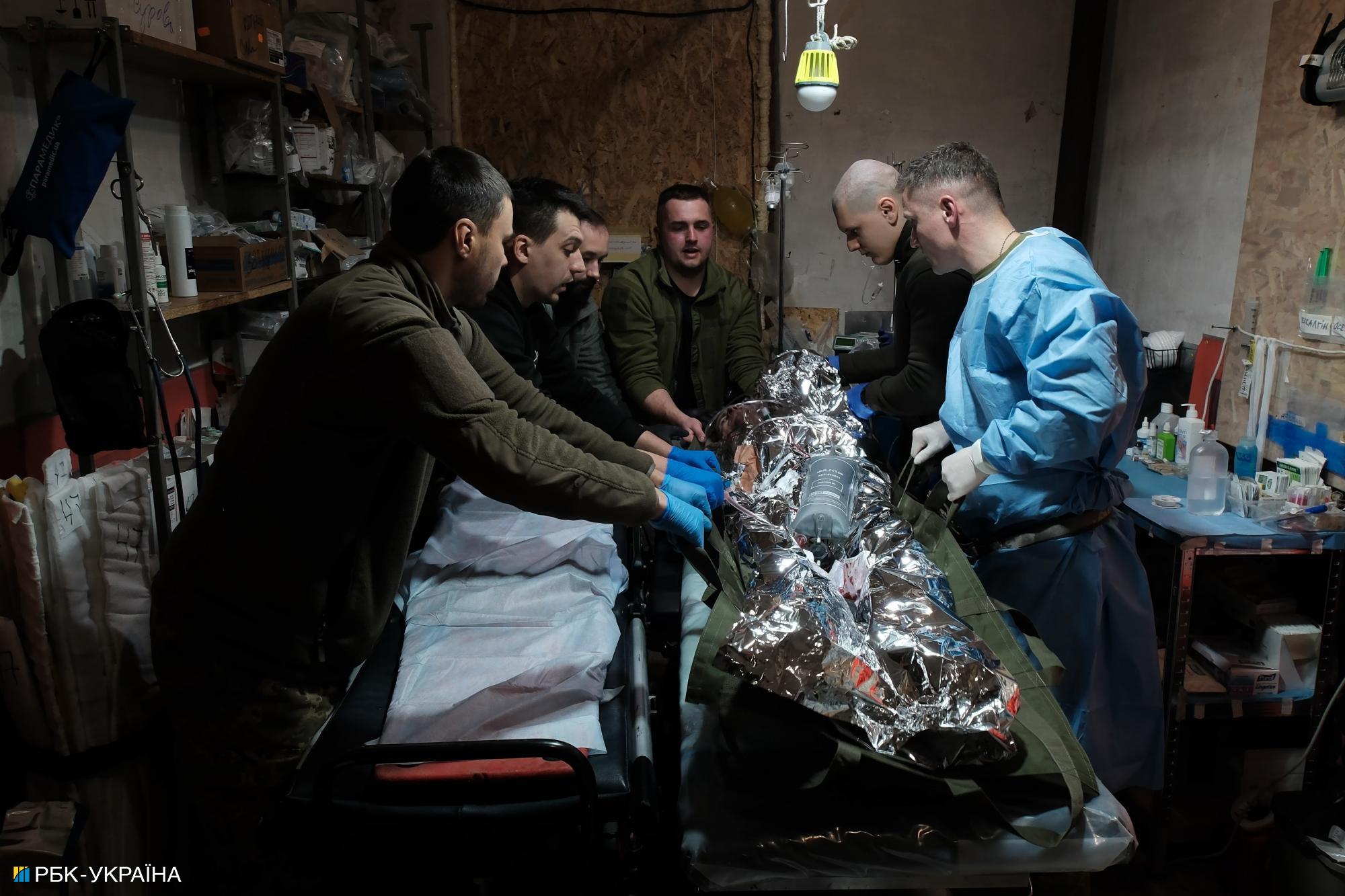
"Red! Quickly to the operating room!"
The medics at the stabilization point continue to fight for the soldier's life. While some suture, pack, and stitch, others hold the soldier's hand and assure him that nothing terrible has happened and he will live.
A dozen more soldiers are brought in after the first one. Each has wounds of different severity, they are distributed among the rooms and carefully examined and assisted. At the stabilization point, there is a clear division of severity among patients. The light and moderate cases are marked green, and the severe ones are marked red.
The chief medic with a call sign Viter ("Wind") in civilian life could probably have been an actor in the theater - he looks like someone who would only play lead roles. But in Ukraine, there's war, so today he is a chief medic Viter. We ask everything we can, but the medic is terse. He says that the number of wounded varies every day, but his team quickly manages to help everyone. They try not to detain soldiers here for long, quickly stabilize them, and perform necessary surgical interventions, and blood transfusions if necessary.
It's been about 30 minutes since the wounded were brought to the stabilization point. The doctors take one of the soldiers out and prepare him for transportation to the hospital. His life is no longer in danger, but there is still a long journey of treatment and rehabilitation ahead.
***
When we step out of the building, it's already getting dark outside. The air is fresh and cold - after several hours in the stabilization point permeated with the smell of blood and medicines, my head's spinning from the freshness. The soldiers who are on the front line today, the fighters who carry them over fields torn by shells, the medics who save their lives - they all work at the limit of their abilities. This is not something you want to talk about loudly, but it seems that this war can only be won on this very limit.

